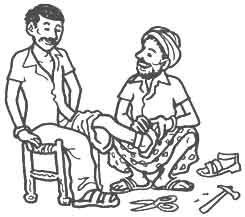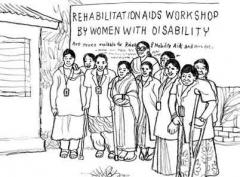Your progress
0%
Listed below are some activities your organization can undertake to make it possible for all people with disabiliities to obtain the assistive devices they need
Use your mouse or keyboard to expand each of the activity headings below. To add an activity to your action plan, select the Add button beside it.

CBR personnel require training on assistive devices to ensure that they can provide accurate information, referrals and education. Training may be specific or part of a course on rehabilitation. CBR personnel need knowledge about:
Practical training is also essential, particularly for CBR personnel who work in rural or remote areas, to ensure they can produce basic assistive devices and develop the skills and confidence to work directly with individuals who need the devices. For example, CBR personnel may need to:
Learn about the simple step CBR in Indonesia took to make sure CBR workers would know what assistive device resources were available.


The CBR in South Sulawesi, Indonesia, prepared an Assistive Device Resource Sheet listing the main service providers in the province who are able to supply and repair devices.
This resource sheet is distributed to all CBR personnel, ensuring accurate information is always available for people with disabilities living in villages.
CBR personnel need to work closely with people with disabilities and their family members to ensure that they are:
Self-help groups enable people to share valuable information, skills and experiences. They can be particularly beneficial when someone has limited access to rehabilitation personnel. Self-help groups can support individuals as they adjust to newly acquired assistive devices, educating them on their care and maintenance.

Local artisans can be trained to make small repairs to assistive devices such as orthoses (e.g. by replacing straps, screws or rivets), prostheses and wheelchairs. CBR can identify local artisans and facilitate this training in partnership with technicians.
Assistive devices such as walking sticks, crutches, walking frames, standing frames and basic seating can also be produced by local artisans because they are simple to make using locally available materials. CBR can identify local artisans who are interested in producing them and facilitate training.
Learn about the training programme set up by the national CBR in Mongolia.


The national disabled people’s organization in Lebanon launched a production unit for wheelchairs and other assistive devices such as crutches, walkers, toilet chairs, orthopaedic shoes and specialized seating systems. They also created five distribution, repair and maintenance workshops around the country to facilitate access to these devices.
The production unit and repair workshops employ people with disabilities. The disabled people’s organization has also ensured an adequate national budget for assistive devices.
CBR organizations can now refer people who need assistive devices to these centres to access assistive devices.
Access to assistive devices may be limited by inadequate information, poverty, distance and centralized service provision. CBR personnel need to work closely with people with disabilities and their families to facilitate access. To do this, they need to be able to:
Learn about the steps taken by the national disabled people’s organization to improve access to assistive devices in Lebanon.


The national disabled people’s organization in Lebanon launched a production unit for wheelchairs and other assistive devices such as crutches, walkers, toilet chairs, orthopaedic shoes and specialized seating systems. They also created five distribution, repair and maintenance workshops around the country to facilitate access to these devices.
The production unit and repair workshops employ people with disabilities. The disabled people’s organization has also ensured an adequate national budget for assistive devices.
CBR organizations can now refer people who need assistive devices to these centres to access assistive devices.
Set up small-scale workshops
When referral services are not available, or barriers such as cost and distance cannot be overcome, CBR can consider setting up and supporting a small workshop to meet local needs. Simple devices can be produced by locally trained people.
Both the WHO CBR manual and Disabled village children provide information about making assistive devices in the community using local resources.
Learn about a small workshop set up at a hospital in Guinea-Bissau.

Train people with disabilities
People with disabilities can also be trained to make assistive devices. This can generate income and lead to their recognition as active contributors to their communities, to the development of social networks and ultimately to empowerment.
Learn how several CBR programmes in Bangalore, India joined forces to help 10 young women with disabilities set up a business building assistive devices.

CBR needs to develop strong links with national and international nongovernmental organizations active in producing and providing assistive devices with a view to the development of sustainable service provision

Several CBR programmes in Bangalore, India, identified a group of 10 young women with disabilities. All of these women faced disadvantages and discrimination because they were poor, uneducated, female and disabled . They were all seen as liabilities within their families and communities. The women all trained as orthopaedic technicians and were provided with a loan from one of the CBR programmes to open a commercial workshop.
Life has changed for the women since they started their business (Rehabilitation Aids Workshop by Women with Disabilities). The workshop started making a profit from the second year and by the end of the fourth year they had repaid the whole loan. They extended their business by becoming agents for several major companies that manufactured assistive devices and health- care products, and by establishing links with major private hospitals in the city. The women are now earning good incomes, have good quality of life and are seen as active contributors to their communities. They are married, are assets to their families and are role models for many people with disabilities.

Cumura Hospital in Guinea-Bissau has a small workshop for preparing orthoses and two people with disabilities have been trained as orthopaedic technicians to work there.1
Finding appropriate materials is often a problem and importing materials is very costly, so the technicians try to find local solutions for designs from other workshops. For example, they have started to make a leather and plastic splint for persons with foot drop.
Very often there are barriers in the home, school, work or community environments that make it difficult for people to use their assistive devices. CBR personnel require practical knowledge regarding these barriers so they can work with individuals, family members, communities and local authorities to identify and address them.